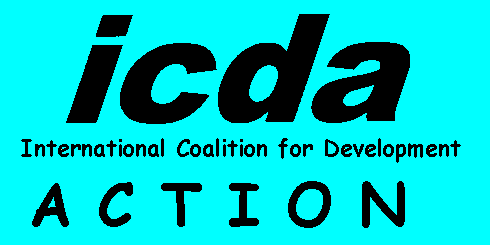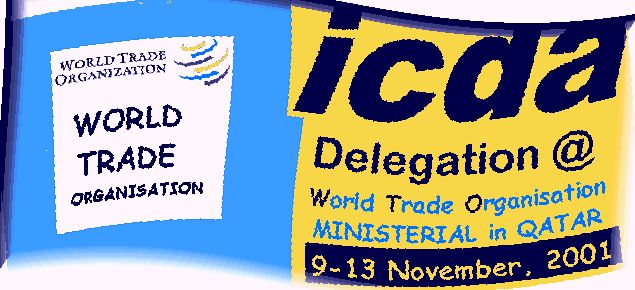
This site is best viewed with
| ICDA LATEST |
ICDA Latest News
Programme areas
ICDA History
| ICDA MEMBERS |
Current Members
| WTO IMPACT LIST |
Subscribe Here
What do you think?
| CENNT |
Latest News
IWGGT (in construction)
| PUBLICATIONS |
Latest ICDA Journal (in construction)
Latest ICDA Update (in construction)
| VACANCIES |
Internship
Book Keeper/Part time administrative Assistant
| HELP |
FAQ's
About Us
Contact Us

| AGRICULTURE >> CROCODILE TEARS: HOW TRIPS SERVES WEST's MONOPOLY |
| By: The East African (Nairobi) Journalist, Odour Ong'wen |
"The patent regime is entrenched in the World Trade Organisation's agreement on Trade-Related Aspects of Intellectual Property Rights (Trips). With the obligations it imposes on member countries of WTO to recognise and strengthen patent protection on pharmaceuticals, it is effectively denying patients in Africa access to life-saving essential medicines."
The recent outcry by a consortium of non governmental organisations in Kenya over the high cost of Aids drugs raised a fundamental question: How does a mercilessly globalising world balance the 3Ps (Pharmaceuticals, Patents and Profits) with the right of patients to access essential drugs?
The right of everyone to good health is well recognised in the International Covenant on Economic, Social and Cultural Rights, one of the key instruments of the International Bill of Rights. The Covenant also obligates every state to create conditions that assure citizens access to all needed medical services.
The issue of affordability of Aids drugs has been arround for quite some time now without East African governments or the international community taking any concrete steps to address it. It is estimated by UNAids that the combined level of HIV infection in Tanzania, Kenya and Uganda is over 4.5 million. What is even more worrying is the fact that this population mainly comprises persons in the 16 to 45 age group.
This is the most productive age segment in our societies. The implication here is obvious: Aids is demolishing our productive base. Couple this with the cost of treating opportunistic infections, the time invested in caring for the sick, the psychological consequences and the need to take care of orphans; and the conclusion that Aids is a development problem is an inescapable one.
The International Aids Conference in Durban, South Africa in July, last year, focused once again on the issue of affordability of essential medicines.
The issue of patented drugs and access to essential medicines is becoming a major controversy. Figures presented at the Durban conference showed that one year's worth of the standard treatment of antiretroviral drugs cost between $4,000 and $6,000. This puts it out of the reach of most people in East Africa.
A key factor in determining the cost of a drug is its patent. Many patients in developing countries die because the drugs are too expensive for them. These patented drugs include treatments for tuberculosis and Aids as well as the Hepatitis-B vaccine.
The patent regime is entrenched in the World Trade Organisation's agreement on Trade-Related Aspects of Intellectual Property Rights (Trips). With the obligations it imposes on member countries of WTO to recognise and strengthen patent protection on pharmaceuticals, it is effectively denying patients in Africa access to life-saving essential medicines.
The aim was to universalise the standards of intellectual property rights (IPRs) protection that developed countries had already incorporated within their legal systems. Thus, Trips agreement now requires all WTO members to adapt their laws to the minimum standards of IPR protection. Africa has been Trip-ped!
The preoccupation of developed countries with IPR protection has an interesting history. During the 1980s, the gradual erosion of the developed countries' supremacy in manufacturing and technology due to the rise of the Asian countries as competitors, became a cause for concern. The industrial lobbies convinced developed-country governments of the need to link trade with IPRs, in order to prevent imitation and to increase returns on research and development.
Monopoly rights granted by IPRs were regarded as crucial to prevent the developing countries from undergoing industrialisation based on imitating and copying technologies, as the developed countries themselves had done. In other words, IPR protection was a tool to guarantee the comparative advantage that had so far ensured the developed countries' technological supremacy.
Implementation of the Trips agreement may lead to high drug prices, low access and a weakening of national pharmaceutical industries, due to the factors described below:
The minimum term of 20-year patent protection required by Trips effectively allows a pharmaceutical company a monopoly over its patented drug. Free from competition, the company can keep the price of the drug as high as it likes during the protection period. By virtue of Trips protection, no generic equivalent can come into the market until expiry of the 20 years, denying patients cheaper alternatives.
The agreement extends the scope of patent protection to both products and processes. Product patents provide for absolute protection of the product, whereas process patents provide protection in respect of the technology and method of manufacture. With the Trips requirement for both product and process patents, it will therefore be possible to apply for patent rights over a product for 20 years, and thereafter, further periods of protection could be applied for the processes by which the product is produced.
Some experts also caution that the 20-year protection can be used to extend the monopoly not only through process patents but also by means of patents on usage form, dosage form and combination form. In the US, patents have been taken out on new combinations of drugs even when the product patent on the basic drug, the active ingredient, has long expired. Monopoly protection can thus be extended through making minor changes to the existing medicines.
Threat to domestic pharmaceutical industries: Although what pass for local pharmaceutical companies in East Africa are satellite stations of multinational corporations (MNCs), other developing-country pharmaceutical producers like India will find themselves pushed out of the market, having to compete with the large MNCs. The smaller producers in the developing world who specialise in manufacturing cheap generics will no longer be able to operate.
The Trips agreement further requires patents to be granted regardless of whether the products are imported or locally produced. This means that patent holders can merely import their product, without having to work the patent in the country granting the right. This will mean that a TNC can supply global markets under the patent monopoly, exporting the finished product instead of transferring technology or making foreign direct investment.
This rubbishes Trips supporters' argument that strict patent regimes will increase the flow of technology and investment into developing countries.
Oduor Ong'wen is the chairman of the Council of NGOs in Kenya
----------------------------------------------------------------------------
Copyright © 2001 The East African. Distributed by AllAfrica Global Media (allAfrica.com).
Please click here to go back to WTOMC Page
Copyright ©E.K.BENSAH II PRODUCTIONS. 1998-2001